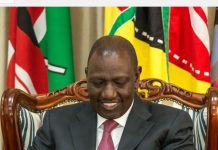
by Faridah N Kulumba
Africa-Press – Kenya. Kenya’s economy is likely to be affected after being placed again on a list of shame known as the ‘grey list’ joining 23 other countries.
This follows the decision made last week by the Finance Action Task Force (FATF), the global anti-money laundering watchdog,placing the country on the grey due to concerns over money laundering activities, particularly those intertwined with the illicit gold trade with the Democratic Republic of Congo (DRC).
Kenya will be under increased scrutiny by the FATF, with the country expected to make critical changes to its financial infrastructure to reduce the risk of being a haven for dirty money.
Also 2010, FATF placed Kenya on a list of high-risk countries for delays in enacting laws to tackle criminal financial activity as well as a failure to track money laundering. It was removed from the list four years later.
FATF
FATF is an intergovernmental policy-making body that determines anti-money laundering (AML) and Countering the Financing of Terrorism (CFT) standards to safeguard the global financial system. It is based in Paris and was created in 1989 at the behest of the G7 political forum to combat money laundering.
Gold smuggling
At the heart of this conundrum lies the unlicensed gold mining operations in Rarieda, Siaya county, as highlighted by High Court advocate Nicholas Abidha. These operations, suspected of being a front for smuggling gold from the DRC, shine a light on the intricate dance between legality and the shadows of illicit trade.
Despite efforts to clamp down on money laundering, including designating lawyers as reporting agents and tightening banking regulations, Kenya grapples with stemming the flow of illicit funds. The involvement of the political class and law enforcement in shielding dubious investors, coupled with the persistence of fraudsters engaging in fake gold scams, exacerbates the situation.
Kenya’s history with gold racketeering, tracing back to 2011, underscores a recurring struggle despite being previously removed from the FATF grey list in 2014 following regulatory improvements.
Money laundering
According to the grey list Kenya is referred to as one of the countries that have deficiencies in dealing with money laundering and terrorist financing.
Money laundering is the act of concealing, disguising, converting, transferring, or removing criminal property and making it appear to have come from a clean source. Money referred to as “dirty money” because it is from criminal activities is cleaned through a process of investing it into business activities deemed legitimate.
Money laundering damages financial sector institutions critical for economic growth by promoting crime and corruption, thereby slowing growth and reducing efficiency in various sectors.
Money laundering can also prevent investors from starting businesses in the listed country which leads to slowing foreign inflows.
The effect of being in the grey list on the economy
Being on a grey list means that Kenya will be under increased scrutiny by the FATF, with the country expected to make critical changes to its financial infrastructure to reduce the risk of being a haven for dirty money.
The list of shame should be a major concern for the country due to several reasons:-
Firstly, in essence, transactions originating from Kenya or made through Kenya’s financial system including cash are subjected to more scrutiny by the international systems. This results in delays in concluding business transactions increasing turnaround time and transaction cost.
Secondly, the country risks being expunged from the Society for Worldwide Interbank Financial Telecommunication (SWIFT), an undesirable situation that can plunge the economy.
Thirdly, given that major financial institutions like the International Monetary Fund (IMF) and World Bank are affiliated with FATF as observers, Kenya risks facing complications in accessing international lending instruments. Even when there are no economic sanctions imposed, the due diligence required before the country can access loans from major financial institutions makes such loans unpalatable with tighter conditions.
The repercussions of being grey-listed by the FATF extend far beyond a mere blemish on Kenya’s reputation. This status signals to the international community that Kenya is under increased scrutiny, which could potentially raise borrowing costs, impact its credit rating, and complicate international trade relations.
The enhanced monitoring by the FATF necessitates a concerted effort from Kenya to strengthen its institutions, reduce illicit money flows, and foster cooperation with international partners for technical assistance to bolster its regulatory framework. The economic implications are profound, potentially affecting everything from foreign funding availability to investor confidence.
Kenya’s reaction
The National Treasury in a statement confirming that Kenya had been placed on the ‘grey list’ explained that it had made several amendments to laws against money laundering and terrorism financing including the AML/CFT (Amendment) Act, 2023.
According to the National Treasury Cabinet Secretary Professor Njuguna Ndung’u,
Kenya is being placed on a ‘grey list,’ indicating enhanced monitoring to ensure compliance with international Anti-Money Laundering, Countering the Financing of Terrorism, and proliferation of Weapons of Mass Destruction (AML/CFT/CPF).
“This underscores the imperative for swift and comprehensive action to bolster our compliance efforts. It is important to note that Kenya underwent an assessment conducted by the Eastern and Southern Africa Anti-Money Laundering Group (ESAAMLG) in 2022. The evaluation revealed a mixed picture.” he said.
A 2022 mutual assessment report by a regional anti-money laundering watchdog identified several strategic deficiencies in its framework for the fight against dirty cash.
The evaluation by the Eastern and Southern Africa Anti-Money Laundering Group (ESAAMLG) found Kenya to be ‘partially compliant’ with the global standards on anti-money laundering and terrorism financing.
Kenya will not be affected
Kenya is optimistic that the latest rating would not impact the country’s economy negatively according to Prof Ndung’u.
He highlighted that the National Treasury is actively engaged in the process and anticipates minimal effects on the country’s financial stability and the costs of conducting business in Kenya.
Kenya is planning to review the progress made to date and develop a comprehensive strategy to address remaining deficiencies. Adequate resources will also be allocated to ensure timely compliance and exit from the grey list.
For More News And Analysis About Kenya Follow Africa-Press





